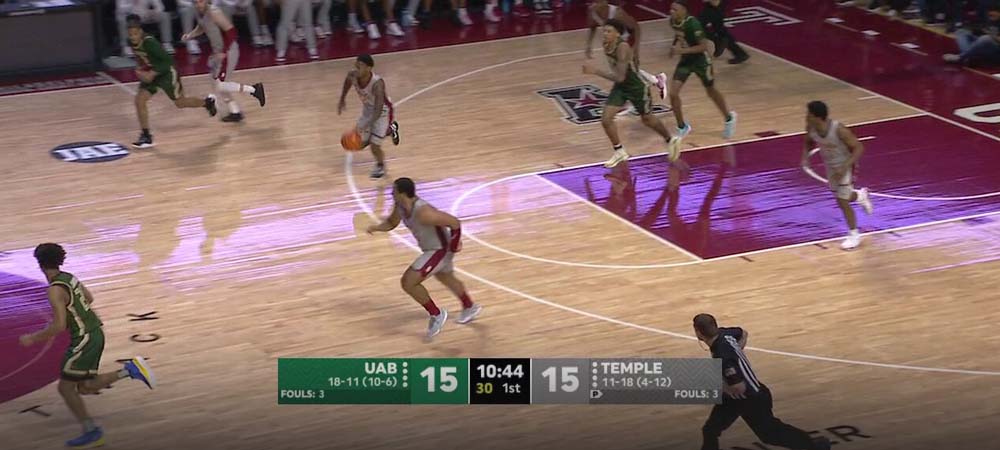- U.S. Integrity has been monitoring Temple men’s basketball games after finding gambling irregularities.
- Instances of coach and athlete manipulation require vigilant regulation over sportsbooks and admin.
- Creating a blanket ban on college sports betting in the US only hides the issues under the rug.
PHILADELPHIA – The intersection of problem gambling, college athletes, and game manipulation poses a serious threat to the integrity of sports. The most recent example of suspicion for this came on Thursday night when U.S. Integrity noted the Temple basketball game held unusual wagering activity.
The betting line jumped over six points in one day, as Temple +1.5 adjusted to Temple +8 before closing at +7. Losing 100-72 against the UAB Blazers, sources say Temple has been under U.S. Integrity’s focus for a while.
Among the NCAA conferences, the AAC is just one of several that has enlisted U.S. Integrity to oversee and monitor USA online gambling activities associated with its member schools. They were involved in exposing the Alabama Crimson Tide baseball gambling scandal last spring, resulting in the dismissal of coach Brad Bohannon.
However instances of athletes succumbing to the influence of gambling syndicates have been reported, raising concerns about the potential compromise of fair play.
While rare, notable cases have emerged over the years, including the Iowa and Iowa state gambling scandal in 2023. This incident shed light on the vulnerability of young athletes to external pressures.
Shouldn’t NIL Change Vulnerability?
The vulnerability of college athletes to manipulation often stemmed from financial pressures, personal challenges, or susceptibility to the allure of quick money. But, with NIL deals afoot, the ability to make money outside of sports is very possible now.
Still, the rise of mobile gambling apps has increased the accessibility of gambling opportunities and wagering types, creating an environment where individuals with inside information can exploit it for personal gain.
College athletes facing financial constraints or who think getting caught is unlikely may find themselves susceptible to such temptations.
Regardless, searching the internet for a while will prove public perception regarding the integrity of college and professional sports varies. While the majority of sports enthusiasts believe in the fairness of competitions, a significant minority suspects foul play. Allegations of game manipulation, match-fixing, or rigged outcomes are often fueled by isolated incidents, but they contribute to a pervasive sense of skepticism among some fans.
Past suspicions or confirmed controversial officiating decisions (i.e. Tim Donaghy), unexpected outcomes, and instances where athletes or teams appear to deviate from their usual performance levels amplify these perceptions, especially on social media, allowing theories to gain traction and influence a subset of fans to question the authenticity of sports outcomes.
The issue of problem gambling and its potential connection to college athletes throwing games highlights the need for proactive measures to safeguard the integrity of sports. Sports organizations, educational institutions, and regulatory bodies must work collaboratively to address the root causes, providing support for athletes facing financial challenges and implementing robust monitoring systems to detect irregularities.
And this has been happening.
While a blanket ban over college sports betting isn’t likely across the US, more states are deciding to completely take college sports off the betting board, evident from Ohio and Maryland in the last few weeks.
But This Doesn’t Solve The Issue
While there may be a ban on college sports betting, users can simply cross borders to place bets, use online gambling sites, or find a neighborhood bookie that’ll take the action under the table.
In most states with legal online gambling, they already offer a ban on in-state college sports betting. But, this ban only works in that specific state, meaning a ride from Exchange Plaza (NJ) to Rockefeller Park (NY) and back or a visit to a nearby state’s welcome center on the highway is the only restriction in place.
In 2024, North Dakota is the only state not bordering a state with online sports betting (excluding Alaska, and Hawaii). South Carolina is also there but gets this title removed on Monday when North Carolina sports betting apps launch for the first time.
In the end, most athletes compete with integrity and dedication, upholding the values that make sports a cherished part of society and it’ll come down to them to keep it this way. However, the specter of corruption remains, and it is essential to remain vigilant.
